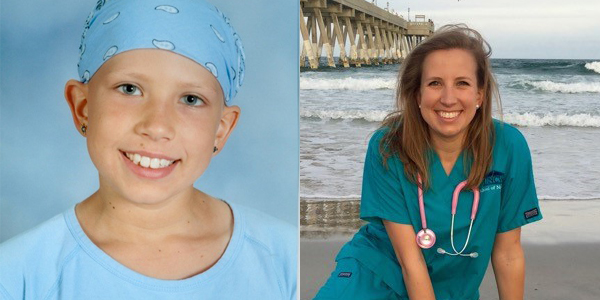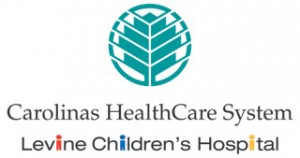CSP Team Note: This interview and its follow-up was originally published on Carolinas HealthCare System’s blog. We thank them for letting us share this incredible story with you in honor of Childhood Cancer Awareness Month.
Sarah Sadler (Fruendt), once a patient at Levine Children’s Hospital, is now a nurse in the same unit where she was treated, and even works alongside some of the same nurses who provided her care.
Update
In September 2016, we shared the story of former patient, Sarah Fruendt, who was working at Levine Cancer Institute – more than a decade after being treated for cancer herself at Levine Children’s Hospital. Fast forward a year later, Sarah, who recently got married and now goes by Sarah Sadler, is now working at Levine Children’s Hospital, alongside the nurse who once cared for her. Sarah says this is her dream job and something she was wanted to do since she was a patient at LCH.
“It is amazing to back now working in the same atmosphere I grew up in as a child battling cancer,” Sadler said. “A lot has changed since I was undergoing treatment – everything used to be on the 7th Foor of the main hospital back then so it’s so encouraging to see how things have grown with the Pediatric Hematology, Oncology, Transplant Clinic – and how Levine Children’s Hospital has a more kid-friendly environment. It brings me so much joy and is truly a pleasure being able to take care of these children and their families because I was taken care of so well when I was in their shoes over 15 years ago. Some of the providers and nurses who helped with my treatment are still working here today and their dedication to this field is inspiring. I am so privileged to work alongside them. Every day I love coming to work aspiring to provide as excellent and extraordinary service to my patients and those surrounding me as I received in the past.”
Read the original story below.
![]()
Sarah Fruendt, 22, works at Levine Cancer Institute – 10 years after being treated for cancer herself at Levine Children’s Hospital. So exceptional was Sarah’s care that she was inspired to become a nurse herself. She now works at the Advance Residency Program for new graduate nurses at Levine Cancer Institute, with a plan to work at Levine Children’s Hospital soon.

Q&A with Sarah
Question: What was it like when you were first diagnosed with cancer?
Answer: When I was about 2 years old, I was diagnosed with acute lymphocytic leukemia. I had chemotherapy treatments for about two years and was in remission after that. When I was 8, however, we received a phone call from my oncologist following a routine test, saying the cancer cells had reappeared. I had relapsed in a less common way, the cancer cells were isolated to my central nervous system, instead of my bone marrow like most leukemia relapses. So after another two years of treatment, including chemo and radiation, I was pronounced done with treatment and cancer-free. I have now been in remission for over 12 years!
Q: What do you remember being the most difficult part of your treatment as a child?
A: I think the most difficult part of cancer treatments for anyone are the side effects, whether you’re an adult or a child. While I don’t remember much from my first experience, I do remember a few challenges from my relapse. This included stares from the kids at my school at my bald head and nights spent on the bathroom floor being sick from the chemo.
Q: What about the most encouraging?
A: The most encouraging part is that, regardless of those few obstacles, I have such a positive view of the whole cancer experience overall. I have no negative memories of the hospital, I actually remember being upset when I was discharged at the end of each treatment because I wanted to stay longer. I was taken care of so well by all of the staff (doctors, nurses, child life, etc.), it was more fun being at the hospital than at home. I believe these uplifting experiences, the amazing support I received from so many people, and distractions from my illness had such a positive impact on my health during treatment.
Q: What was it about your experience that made you want to be a nurse?
A: The simple answer is that the nurses who took care of me are who inspired me to be a nurse when I grew up. They were my superheroes, spending the entire day taking care of me, making me laugh and spending time with me. Two of my nurses – Shannon (Byrd) Brown and Jennifer Riggall – used to make me feel so special when they told me they had to fight over who would get to have me as their patient each day. Being able to spend an entire day of “work” helping and caring for people seemed like the best future career and I can’t imagine ever choosing a better profession than this!
Q: How does your previous cancer diagnosis affect the way you interact with patients?
A: While everyone’s cancer experience is unique, I have found that my previous cancer diagnosis allows me to understand what these patients are going through because I was one. I remember what it felt like, how everything changed when I relapsed, so I can empathize with those who are going through similar experiences. I have found that many survivors are the ones who appreciate life the most, so my goal now as a nurse is to make sure my patients receive the same extraordinary, uplifting care that I did so many years ago. It’s what motivates me to do my best every day, caring for each person and patient I interact with.
Q: Tell us about your oncologist, Dr. Barry Golembe.
A: My doctor was Dr. Barry Golembe, he was my oncologist since I was first diagnosed at age two. We followed him over to Levine Children’s Hospital when I relapsed, and I received exceptional care from all of the staff, inpatient and out. My parents say Dr. Golembe is my “Dad #2” since he has been a part of my life since the beginning, and I love to update him on my nursing progress.
Q: What do you want people to recognize about childhood cancer?
A: In today’s society, it’s practically impossible for people to be unaware of childhood cancer. We all laugh and cry at the stories of children’s wishes granted and their perseverance through treatments on social media sites and on television, but that’s where the recognition stops. Children are affected by so many different types of cancer and instead of reading stories online, people need to embrace this aspect of our community and support each other. There’s no good time to get cancer, but for children and teens it is much more difficult to recover from the devastating cancer world when they are still growing, learning and forming identities themselves.
![]()
Levine Children’s Hospital
Facebook
Instagram
Twitter
Pinterest



